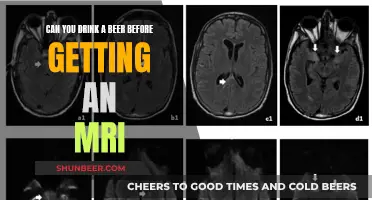
Drinking too much beer can have serious consequences for your health, both immediate and long-term. While moderate drinking may be linked to certain benefits, such as a reduced risk of heart disease, excessive alcohol consumption increases the risk of several health issues. These include unintentional injuries, violence, risky sexual behaviours, memory and learning problems, early and permanent dementia, inflammation and damage to tissues and organs, chronic diseases (including liver disease, stroke, high blood pressure, and cancer), ulcers and gastrointestinal issues, malnourishment and vitamin deficiency, a weakened immune system, obesity, and mental health issues such as depression and anxiety.
| Characteristics | Values |
|---|---|
| Number of beers considered excessive drinking for men | 5 or more in 2 hours or 15 or more per week |
| Number of beers considered excessive drinking for women | 4 or more in 2 hours or 8 or more per week |
| Health risks | Unintentional injuries, violence, risky sexual behaviours, miscarriage, stillbirth, fetal alcohol syndrome, memory and learning problems, early and permanent dementia, inflammation and damage to tissues and organs, chronic diseases (liver disease, heart disease, stroke, high blood pressure, and cancer), ulcers and gastrointestinal issues, malnourishment and vitamin deficiency, weakened immune system, higher risk of obesity, depression and anxiety |
What You'll Learn

It can cause digestive issues
Drinking too much beer can cause a range of digestive issues. Beer is made by fermenting sugars from starches, and its major components include barley, hops, water, and yeast. While beer contains minerals such as magnesium, potassium, selenium, and B vitamins, as well as antioxidants from hops, excessive consumption can lead to digestive problems.
Firstly, heavy drinking can damage the tissues in the digestive tract and cause issues with the intestines' ability to absorb nutrients and vitamins during digestion. This can lead to malnutrition and increase the risk of developing conditions such as ulcers and haemorrhoids.
Secondly, excessive beer consumption can lead to digestive discomfort and digestive tract issues. It can cause diarrhoea and painful bowel movements, indicating potential issues with the digestive system.
Additionally, alcohol can irritate the small intestine and colon, affecting the normal speed at which food moves through them. This can result in abdominal pain, bloating, and diarrhoea.
Furthermore, when consumed in large amounts, alcohol can cause intestinal inflammation and negatively impact the gastrointestinal tract and the liver. It can alter the bacteria in the gut and permeate the lining of the intestine (leaky gut syndrome), making the body more susceptible to alcohol-related diseases, including alcoholic fatty liver disease.
However, it is important to note that some research suggests that beer, due to its fermented compounds, may have potential benefits for gut health.
To summarise, while moderate beer consumption may offer some health benefits, excessive drinking can lead to various digestive issues, including malnutrition, intestinal inflammation, and gastrointestinal problems. It is crucial to consume alcohol in moderation and responsibly to maintain overall health and well-being.
Ice-Cold Beer: Good or Bad?
You may want to see also

It can lead to chronic diseases
Drinking too much beer can lead to chronic diseases. According to the National Institute on Alcohol Abuse and Alcoholism, drinking too much beer can affect your brain's communication pathways and its ability to process information. It can also cause sleep impairment, even if you consume a light amount of alcohol during the day. A 2018 study published in JMIR Mental Health found that even light drinkers (men drinking two or fewer servings and women drinking one or fewer) experienced a 9.3% decrease in sleep quality.
Drinking too much beer can also cause intestinal inflammation and issues within the gastrointestinal tract and the liver. Alcohol can negatively alter the bacteria in your gut and permeate the lining of the intestine (leaky gut syndrome), making the body more susceptible to alcohol-related diseases, including alcoholic fatty liver disease.
The Centers for Disease Control and Prevention (CDC) states that excessive drinking can increase the risk of high blood pressure, stroke, heart failure, and cardiomyopathy, a disorder that affects the heart muscle. It can also increase the risk of certain types of cancer, such as mouth, throat, voice box (larynx), esophagus, colon and rectum, liver, and breast cancer for women. The American Cancer Society says that alcohol consumption accounts for 6% of all cancers and 4% of cancer deaths in the United States.
In summary, drinking too much beer can lead to various chronic diseases, including liver disease, heart disease, stroke, high blood pressure, and cancer. These risks are elevated when drinking exceeds the recommended limits, which are up to four drinks a day for men and up to three drinks a day for women.
Drinking and Driving: One Beer, Safe to Drive?
You may want to see also

It can disrupt sleep
Drinking beer, or any other type of alcohol, can disrupt sleep. While it is known to make people feel relaxed and even euphoric, the intoxication from alcohol can affect the brain's long-term health. According to Kimberly Gomer M.S., RD, LDN, alcohol can slow down reflexes and impair balance, memory, and sleep.
The National Institute on Alcohol Abuse and Alcoholism (NIAAA) states that alcohol affects the brain's communication pathway and its ability to process information. Even light drinking can disrupt sleep. A 2018 study published in JMIR Mental Health found that even light drinkers (men having two or fewer servings and women having one or fewer) experienced a 9.3% decrease in sleep quality. When alcohol is consumed, the liver metabolises it, which can result in a night of disturbed sleep.
The NIAAA also states that drinking alcohol can increase the risk of insomnia. Furthermore, according to WebMD, alcohol can make insomnia worse.
Drinking beer before bed can cause a "rebound effect", according to a study by the National Institute of Health. This means that it takes four to five hours for the alcohol to leave the body, which could disrupt sleep. Therefore, it is best to have a beer earlier in the day and to only drink occasionally, rather than every night, to ensure consistent nights of good sleep.
Whiskey and Beer: Mixing Alcohol Types Safely
You may want to see also

It can cause unintentional injuries
Drinking too much beer can lead to unintentional injuries, such as car crashes. Alcohol impairs reflexes, balance, memory, and sleep, making driving or operating machinery dangerous. According to the National Institute on Alcohol Abuse and Alcoholism, drinking large amounts of alcohol can increase your blood alcohol concentration (BAC) to 0.08% or higher, which is considered binge drinking. This level of intoxication can affect your brain's communication pathways and its ability to process information, leading to impaired judgment and reflexes. As a result, the risk of unintentional injuries, such as car accidents, increases.
In addition to car crashes, drinking too much beer can also increase the risk of other unintentional injuries. Alcohol can affect your balance and coordination, leading to falls or other accidents. It can also impair your decision-making ability, leading to misjudgments that can result in injuries. For example, drinking too much beer can lead to engaging in risky behaviours, such as unprotected sex or violent acts, which can result in unintentional injuries or harm to others.
The effects of alcohol on the body are dose-dependent, meaning that the more you drink, the higher the risk of unintentional injuries. Binge drinking, which is defined as consuming five or more drinks (for men) or four or more drinks (for women) within two hours, significantly increases the risk of injuries. However, even drinking smaller amounts of beer can still impair your reflexes, balance, and judgment, especially when combined with certain medications or existing medical conditions.
To reduce the risk of unintentional injuries, it is important to drink responsibly and within the recommended limits. For men, it is generally considered safe to consume up to four drinks in one day or 14 drinks per week. For women, the limit is typically three drinks in one day or seven drinks per week. It is also important to avoid drinking and driving or operating heavy machinery, as the effects of alcohol can impair your ability to safely perform these tasks.
Beer and Painkillers: Safe Mix or Not?
You may want to see also

It can increase the risk of certain cancers
Drinking too much beer can increase the risk of certain cancers. According to the American Cancer Society, alcohol consumption accounts for 6% of all cancers and 4% of cancer deaths in the United States. Excessive drinking has been linked to an increased risk of mouth, throat, voice box (larynx), oesophagus, colon, rectum, liver, and breast cancer in women.
The link between alcohol consumption and cancer has been supported by various studies. A 2018 study published in Nutrients found a connection between moderate drinking and improved heart health due to a potential decrease in HDL ("good") cholesterol. However, a more recent 2022 systematic review published in The American Journal of Medicine concluded that the benefits of alcohol consumption, particularly wine, in cardiovascular health may have been overestimated in previous studies. This review suggested that factors such as genetics, lifestyle, and socioeconomic associations with wine consumption may not have been adequately considered in previous research.
The National Health Service (NHS) in the UK also acknowledges the link between drinking and cancer. The NHS advises that regularly drinking more than 14 units of alcohol a week can damage one's health. It further states that there is now a better understanding of the link between drinking and some illnesses, including a range of cancers such as mouth cancer, throat cancer, and breast cancer.
The negative health consequences of excessive drinking are not limited to cancer. According to the Centers for Disease Control and Prevention (CDC), excessive drinking can increase the risk of high blood pressure, stroke, heart failure, and cardiomyopathy, a disorder that affects the heart muscle. Additionally, long-term excessive drinking can lead to liver problems, malnutrition, vitamin deficiency, and a weakened immune system.
Beer and Penicillin: A Dangerous Mix?
You may want to see also
Frequently asked questions
Heavy drinking is defined as drinking more than 14 units of alcohol per week. This is equivalent to 14 cans of beer per week.
Drinking too much beer can cause digestive issues such as abdominal pain, bloating, and diarrhea. It can also disrupt your sleep and slow down your weight loss.
Long-term excessive drinking can lead to chronic diseases such as liver disease, heart disease, stroke, high blood pressure, and certain types of cancer. It can also increase the risk of dementia and malnutrition.
If you're concerned about your beer consumption, it's important to seek professional help. You can start by consulting your doctor and being honest about your drinking habits. There are also many resources available, such as support groups and treatment programs, that can help you cut back or quit drinking.







